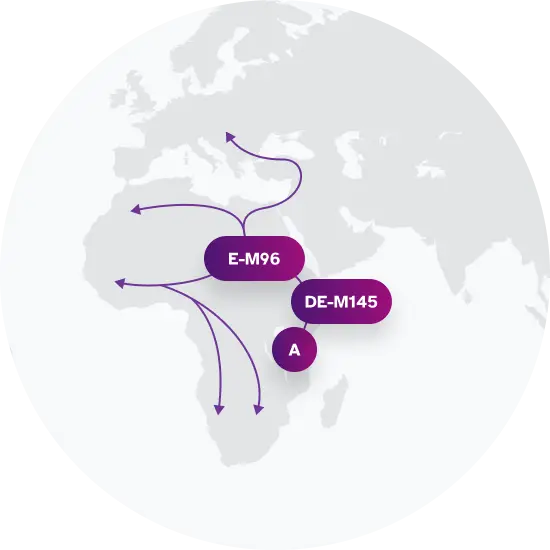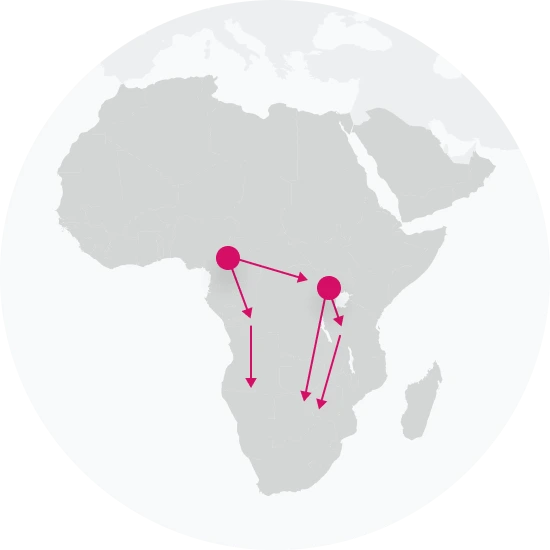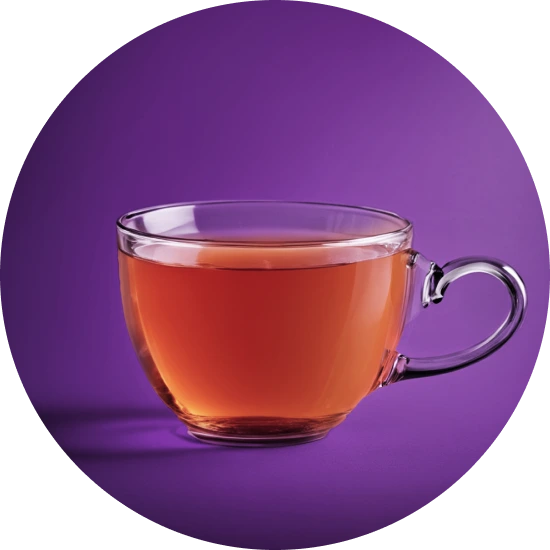Explore the Family Name Mohamed
The meaning of Mohamed
1. Muslim: variant of Muhammad. This form is most common in Egypt and Sudan. Compare Mohammed. 2. Somali: from a variant of the Somali Muslim personal name Mahamed, a cognate of 1 above. — Note: Since Somalis traditionally do not have hereditary surnames, this name was in most cases registered as such only after immigration of its bearers to the US. Some characteristic forenames: Arabic/Muslim Mohamed, Ahmed, Ali, Hassan, Bibi, Ibrahim, Abdul, Saleh, Hesham, Abdi, Mohamud, Salah.
Dictionary of American Family Names, 2nd edition, © Oxford University Press, 2022.
How common is the last name Mohamed in the United States?
Based on the Decennial U.S. Census, the popularity of the surname Mohamed has significantly increased in the United States over a decade. In 2000, this surname was ranked 2,655th but by 2010 it rose to the 1,257th position. This represents an increase of approximately 52.66% in popularity ranking. Additionally, the count of individuals with this surname also surged from 12,499 in 2000 to 27,972 in 2010, indicating a growth of 123.79%. Consequently, the proportion per 100k population doubled from 4.63 to 9.48 during this period.
| 2000 | 2010 | Change | |
|---|---|---|---|
| Rank | #2,655 | #1,257 | 52.66% |
| Count | 12,499 | 27,972 | 123.79% |
| Proportion per 100k | 4.63 | 9.48 | 104.75% |
Race and Ethnicity of people with the last name Mohamed
In terms of ethnic identity, the Decennial U.S. Census data reveals a significant shift over the course of ten years. In 2000, the highest proportion of the surname Mohamed was associated with the Black ethnicity at 36.78%, followed by those who identified with two or more races at 27.37%. However, by 2010, the largest increase was observed among the Black ethnicity, skyrocketing to 65.60%. On the other hand, there was a dramatic decrease in the percentage of people with this surname identifying as two or more races, dropping to 3.78%. The percentages of Asian/Pacific Islander, White, and Hispanic ethnicities also experienced declines while the count for American Indian and Alaskan Native remained unchanged.
| 2000 | 2010 | Change | |
|---|---|---|---|
| Black | 36.78% | 65.6% | 78.36% |
| White | 21.22% | 20.08% | -5.37% |
| Asian/Pacific Islander | 11.91% | 8.23% | -30.9% |
| Two or More Races | 27.37% | 3.78% | -86.19% |
| Hispanic | 2.34% | 1.94% | -17.09% |
| American Indian and Alaskan Native | 0.38% | 0.38% | 0% |
Mohamed ancestry composition
23andMe computes an ancestry breakdown for each customer. People may have ancestry from just one population or they may have ancestry from several populations. The most commonly-observed ancestry found in people with the surname Mohamed is Somali, which comprises 25.9% of all ancestry found in people with the surname. The next two most common ancestries are Egyptian (13.4%) and Northern Indian & Pakistani (8.9%). Additional ancestries include Sudanese, Peninsular Arab, Ethiopian & Eritrean, British & Irish, and Southern Indian & Sri Lankan.
Ready to learn more about your ancestry? Get the most comprehensive ancestry breakdown on the market by taking our DNA test. Shop 23andMe
| ANCESTRY BREAKDOWN | COMPOSITION |
|---|---|
| Somali | 25.9% |
| Egyptian | 13.4% |
| Northern Indian & Pakistani | 8.9% |
| Other | 51.9% |

Possible origins of the surname Mohamed
Your DNA provides clues about where your recent ancestors may have lived. Having many distant relatives in the same location suggests that you may all share common ancestry there. Locations with many distant relatives can also be places where people have migrated recently, such as large cities. If a large number of individuals who share your surname have distant relatives in a specific area, it could indicate a connection between your surname and that location, stemming from either recent ancestral ties or migration.
Based on 23andMe data, people with last name Mohamed have recent ancestry locations spanning a few countries, mostly in Somalia, and the United Kingdom of Great Britain and Northern Ireland.
| RECENT ANCESTRY Location | Percentage |
|---|---|
| Banaadir, Somalia | 30.00% |
| Mudug, Somalia | 25.90% |
| Galguduud, Somalia | 24.70% |
| Bari, Somalia | 23.60% |
| Shabeellaha Hoose, Somalia | 20.80% |
What Mohamed haplogroups can tell you
Haplogroups are genetic population groups that share a common ancestor on either your paternal or maternal line. These paternal and maternal haplogroups shed light on your genetic ancestry and help tell the story of your family.
The top paternal haplogroup of people with the surname Mohamed is E-V32, which is predominantly found among people with Sub-Saharan African ancestry. Haplogroup E-V32 is descended from haplogroup E-M96. Other common haplogroups include J-CTS5368 and E-M183, which are predominantly found among people with European and European ancestry. Other surnames with similar common haplogroups are: Hassan, Omar, Ibrahim, Ali, Farah, Ahmed, Osman, Hussein, Ismail, Schwartz.
The most common maternal haplogroups of people with Mohamed surname are: M, H, L2a1. These most commonly trace back to individuals of European and Sub-Saharan African ancestry.
 Paternal Haplogroup Origins E-M96
Paternal Haplogroup Origins E-M96Your maternal lineage may be linked to speakers of the Bantu language family
About 5,000 years ago, many people in sub-Saharan Africa still relied on hunting, gathering, and foraging as their main means of collecting food. But that was soon going to change. People in West-Central Africa began experimenting with agriculture, cultivating the yams, legumes, peppers, and gourds that would became staples of sub-Saharan African diet. These people spoke languages belonging to the Bantu language family, and about 4,000 years ago they began to move.First, they headed east across the central rainforest. Eventually, the descendants of these migrants arrived at the farthest reaches of southern Africa. Later, other Bantu speakers who had remained in West Africa also began to travel down the western coast. As they traveled over a period of centuries, they both displaced and absorbed many other hunter-gatherer groups that were already living throughout Africa.Their agricultural and technological knowledge also diffused to other local groups. They often intermarried, sometimes adopting local cultural practices of those people they encountered. The languages that they brought with them from their ancestral homeland spread throughout sub-Saharan Africa, and today the majority of sub-Saharan African languages are Bantu.

What do people with the surname Mohamed have in common?
Spoiler alert: it's complicated. People with the same last name are usually no more genetically similar than a randomly sampled group of people from the same population. That said, people with the same surname are more likely to have similar ancestries than randomly sampled individuals. The reason is the tendency of people with similar cultural or geographical backgrounds to preferentially mate with one another. That's why people who share a surname may be more likely to share traits and tendencies in common than people within the general population. Check out the percentages below to see the prevalences of tastes, habits, and traits of people with your surname compared with prevalences among 23andMe users.
Preferences
Traits
Habits
Wellness

Migraine
A severe headache characterized by intense pain, sensitivity to light and sound, and often accompanied by nausea and vomiting.
"Mohamed" Surname 10.4%
23andMe Users 16.4%
Are health conditions linked to the last name Mohamed?
The short answer is that, if there is an association between surname and health, it's usually more about your ancestry than your name. Individuals with a given surname are no more genetically similar than the general population but often have similar ancestries. The populations of people associated with those shared ancestries often have sets of genetic variations, also known as alleles, in common. Some of those alleles are associated with a greater likelihood of developing certain diseases.
Disease variant frequency by ancestry
Disease allele frequencies in populations associated with the surname Mohamed are shown below. Important Note: not everyone with a disease allele will develop these health condition

















